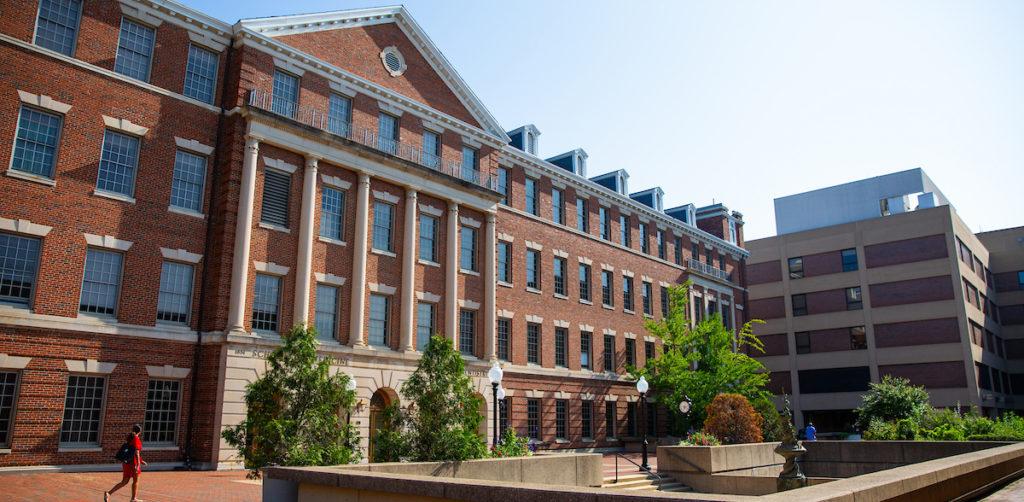A team of students at the Georgetown University School of Medicine created a program aimed at decreasing barriers to healthcare access for refugees who have recently arrived in the United States.
The Health Navigator Program initiative directs refugees to critical healthcare services and pairs them with a trained volunteer, who checks in with them weekly to help them make medical appointments, communicate with physicians and address other health needs. The program’s co-founders, Emily Phelps (MED ’24), Ruba Omeira (MED ’24), Thu Dao (MED ’24) and Mohamad Almasri (MED ’24), met through a community-based learning course they took through NOVA Friends of Refugees, an interfaith refugee support network.
During the course, Omeira said they were inspired to create the program after learning about the challenges refugees face while accessing medical resources.
“There are so many convoluted layers that one must pass through before the ‘patient meets doctor’ event occurs,” Omeira wrote to The Hoya. “I personally find it all so daunting, so I can only imagine how difficult it is for someone new to this country, particularly a refugee who has likely experienced loss and trauma.”

From understanding qualifications for and limitations of insurance to following up on specialist referrals from primary care doctors, Omeira said the many components of the healthcare system can be confusing to navigate.
When developing the program, the team prioritized volunteer recruitment from a wide variety of backgrounds to create sustainable long-term support for refugees, Phelps said.
“We thought it would be really cool if we could make this program interdisciplinary and we recruited volunteers from the medical school, nursing school, post-bacc pre-med students, SMP and GEMS students,” Phelps told The Hoya.
In total, over 100 volunteers worked with 60 refugee families, primarily from Afghanistan, during the 2021-22 cycle after the Health Navigator Program launched last September, according to a Sept. 29 press release from the School of Medicine.
“We ended up having too many interested student volunteers than there were families ready to be matched,” Phelps said. “This was exciting that there was so much interest, but we know it was disappointing some of the volunteers were not able to participate.”
Sarah Kureshi, a professor in the School of Medicine’s family medicine department and the teacher of the NOVA community-based learning course, said she is encouraged by the local impact her former students are making.
“As I’ve gone through my career, I’ve found there are so many different ways to do global health and it’s really rewarding to do local global health,” Kureshi told The Hoya. “It’s not like you have to fly overseas, there is such a need for care in our populations just in our backyards. It’s even more meaningful to live in a community and provide care, because you have more context.”
Dao said the co-founders are planning to expand the program and improve its quality to ensure it not only serves the needs of refugees, but also creates meaningful experiences for volunteers.
Sarah Wong (GRD ’22), whose mother emigrated from Myanmar to escape religious persecution, said she volunteered with the Health Navigator Program because of her family’s past experiences and a desire to give back to those less fortunate than herself.
“I empathize with those who sought out America for greater opportunities and have overcome barriers I could probably never imagine,” Wong wrote to The Hoya. “The Health Navigator Program offered a channel to support these refugees, as so often conflicts taking place across the world can otherwise feel so removed from our daily lives.”
Wong said her experiences with the refugee families she worked with through the program have given her more clarity on existing disparities in healthcare as well as her own future plans.
“The current healthcare system places those who are not primarily English-speaking and U.S.-born at a disadvantage, and the perspectives I’ve gained through this program fuels a desire to give back to these communities and better understand these social determinants that pose barriers to health as a future physician,” Wong said.
Looking ahead, Phelps said she hopes the Health Navigator Program can serve even more refugee families through new partnerships with various grassroots organizations in the community.
“Once the operations have become more solidified and routine, I hope we can expand our volunteer base to accommodate the needs of newly arrived refugees resettled in the DMV area, as well as provide the experience and garnered knowledge for our future leaders in the healthcare field about the barriers refugees face in accessing care,” Phelps said.




















